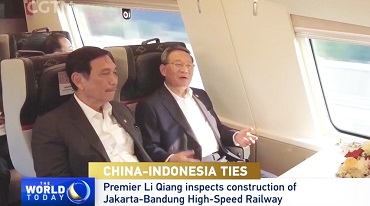The Australian Alert Service is the weekly publication of the Australian Citizens Party.
It will keep you updated on strategic events both in Australia, and worldwide, as well as the organising activities of the Citizens Party.
To subscribe to the Australian Alert Service, it's easy, and it's secure.
Lead Editorial
13 September 2023
Vol. 25 No. 37
As the world changes rapidly Australia has a clear choice: either we stick with the war-mongering, destructive global military industrial complex to which we are subjugated, or, we support our own sovereign development and that of our closest neighbours, by joining the growing BRICS club—Brazil, Russia, India, China, South Africa, plus six new members—if they will take us!
The military industrial complex is an extension of the Anglo-American monster of which outgoing US President Dwight Eisenhower warned in 1961, now deeply embedded in Five Eyes nations (USA, UK, Canada, Australia, New Zealand) and beyond. The Five Eyes was an outgrowth of the Anglo-American “Special Relationship”, a creation designed to underpin expansion of a City of London-centred imperial order which had reached an end, at least in its present form, at the end of World War II. The new order that emerged, from the declaration of the Cold War, allegedly to guard against the menace of Soviet Communism, by (then former) British PM Winston Churchill and US President Harry Truman in 1946, hinged on supressing any major power that might challenge the dominance of the USA and UK in their newly minted Special Relationship. This was re-stated by US Assistant Secretary of Defence Paul Wolfowitz at the end of the Cold War, ahead of the new era of regime-change wars, in the 1992 “Wolfowitz Doctrine”.
Australia jumped on board with this strategy and in recent years our leaders proclaimed that our industry strategy would be linked to military development, opting for “seamless integration” with the USA, and becoming a “domestic source” for our dangerous ally under the US Defence Production Act. The impact of this on our international relations was seen when Russian officials recently pointed to the impact of Australian-made drones hitting Russian targets (p. 6). This is just the start of rising tensions and conflict of this kind, with more nations, if we decide to keep our wagon hitched to the military-industrial complex as opposed to the peace- and cooperation-oriented BRICS.
The BRICS conference last month and last week’s G20 Summit, which was fully oriented to uplifting and developing lesser developed regions with a “human-centric” approach (p. 12), prove that the age of Anglo-American hegemony is over. The barbarians of developing nations are not amassing at the gates: they have constructed a new, more popular world beyond the gates, to which most of the world is heading. Efforts to reinvent the Cold War/Wolfowitz strategy will fail, ending in World War and nuclear annihilation. Australia must recognise this and jump ship now.
The post-WWII Special Relationship also included construction of a new financial hegemony, resting on a merger of Wall Street and City of London interests. Mirroring the strategic reality, this financial hegemony is unravelling as the financial system collapses, in contrast with the new financial order envisioned by the BRICS.
Still, attempts to keep the dying system alive continue. The 24-26 August Jackson Hole central bankers’ forum foreshadowed a new “playbook” to deal with oncoming crises, in the words of European Central Bank head Christine Lagarde (AAS 6 Sept.). This means new ways to loot the population to save the system. Outgoing Reserve Bank of Australia chief Philip Lowe, in his final speech on 7 September, indicated Australia’s commitment to the failing order, calling for a “rethinking of the existing financial architecture”.
Renowned Australian economist Steve Keen hit on the only architectural change that will allow Australia to survive the meltdown, namely, establishing a public bank. He tweeted the Australian Citizens Party’s postal bank petition on 12 September, saying the “Best way to rein in this corrupt banking power is to re-establish a public banking alternative”.
The big question raised by all this is, will the BRICS want us? If we embrace development, yes. And reviving a public bank to put people first would be a great way to show it!
In this issue:
- Urge your Council to get behind the public bank solution for communities losing banks and post offices
- Australia Post loss another death-knell for essential services
- Australia edges nearer to war with Russia
- Foreign interference inquiry riddled with foreign interference
- Developing countries orient G20 to new vision
- Washington divided over facing Ukraine defeat
- The US-Australia Force Posture Agreement constitutes a serious loss of sovereignty over our territory
- Hell hath no fury like a town scorned!
- Bipartisan delegation off to Washington to advocate for Assange
- ALMANAC: Frightened by BRICS-led global shift, Anglo-American financiers attack Argentina
Click here to find out how to subscribe. For freely available AAS articles, click here.
Click here for the archive of previous issues of the Australian Alert Service








